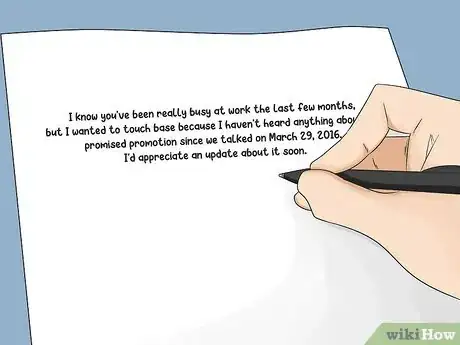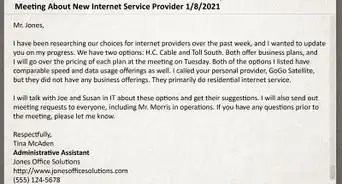This article was co-authored by Julia Yacoob, PhD. Dr. Julia Yacoob is a Licensed Clinical Psychologist practicing in New York City. She specializes in Cognitive Behavioral Therapy (CBT) for adults coping with a variety of symptoms and life stressors. Dr. Yacoob earned an MS and Ph.D. in Clinical Psychology from Rutgers University, and pursued specialized training at Weill Cornell Medical College, New York Presbyterian Hospital, Memorial Sloan-Kettering Cancer Center, the Institute for Behavior Therapy, and Bellevue Hospital Cancer Center. Dr. Yacoob is a member of the American Psychological Association, Women’s Mental Health Consortium, NYC Cognitive Behavioral Therapy Association, and Association for Cognitive and Behavioral Therapies.
There are 7 references cited in this article, which can be found at the bottom of the page.
This article has been viewed 127,453 times.
Do you have the type of boss who likes to hold out rewards and possibilities in front of you without ever fulfilling promises? You probably kept hoping that something would happen or improve in time, but after awhile you likely felt less motivated to work when you weren't rewarded. Dealing with a boss who doesn’t deliver on promises is difficult, but you can hold him/her accountable by keeping records, checking in regularly, evaluating your progress, and taking care of yourself by knowing when to look for other opportunities.
Steps
Holding Your Boss Accountable
-
1Talk to your boss. If your boss doesn’t respond to you, try talking with them again in person. Be upfront in a polite and assertive manner and bring along your written summary of the promise. Keep it factual, thank the boss for letting you have the opportunity, and be genuine about how the experience has readied you for the promised promotion, bonus, job change, etc. Send another follow-up email after this talk summarizing your conversation.[1]
-
2Make it about you. Getting your boss to meet your needs and fulfill his/her promises will be easier when you make it about you, rather than questioning his/her competence or integrity. Be specific about what you need from your boss in order to get the promise fulfilled. Consider if you need more helpful feedback, assistance from another colleague, etc.[2]
- For example, if you were offered a promotion but it hasn’t gone through yet, you can say, “I want to get that promotion we agreed on and I need your help to do that. Give me input on what I’m doing right or what other direction I should head in with this position to get me to that promotion.”
Advertisement -
3Check in frequently. Once you’ve made the promise and you’ve asked for feedback and help from your boss to get it fulfilled, check back in with your boss on a weekly basis. Implement the feedback your boss has given you and update him/her on the progress you make toward that promotion (or whatever it is) every week. After a month or two has passed and you’ve fulfilled all of your boss’ expectations, it’s time to meet with them again and get them to re-evaluate their promise.[3]
- You can say, “We’ve been discussing a promotion since March and I feel I’ve been on track for that by meeting and exceeding goals and objectives for the last three months. I’d like to know what else I should do and how we’re going to move forward with the promotion now.”
- Keep in mind to keep a timeline and record of all your check-ins with your boss, preferably via email in case you need to consult Human Resources later.
-
4Avoid anger and resentment. It can be hard when bosses are being vague about promises not to get angry or frustrated.[4] While it may be tempting to get mad, shout, and threaten to quit after you’ve worked hard at your job, this could make the situation worse. Instead, you boss may feel threatened and try to find a reason to fire you.[5]
-
5Share the impact of the broken promise. Instead of getting angry, let your boss know how you feel about the broken promise. Be clear about how this has impacted you.[6] This holds them accountable and might make them feel guilty for their actions.[7]
- You can say, “I feel unhappy that I haven’t been promoted by now. I feel like I’ve worked hard toward that goal and met your expectations.”
-
6Give a reminder in writing. Send your boss a gentle reminder of the promise they made you. Be brief and simply request more information, rather than accusing or getting angry. The best way is to send a quick e-mail, but be mindful that your boss may not get back to you right away.[8]
- You can say, “I know you’ve been really busy at work the last few months, but I wanted to touch base because I haven’t heard anything about my promised promotion since we talked on March 29, 2016. I’d appreciate an update about it soon.”
-
7Get help. If your boss still doesn’t respond to you or help you, go to his superiors or consult Human Resources for help. However, proceed with caution. Your boss and his superiors could feel threatened. Try to show them the pattern of broken promises that has emerged over time with your boss.[9] You can:
- Schedule a one-on-one meeting with your boss' superior (without your boss present) or the Human Resources department.
- Bring along any paper trails you have of your bosses promises, such as meeting minutes or emails.
- Briefly explain how the broken promises have impacted your work at the company.
- Request a change in position or a new boss to better achieve your goals in the company.
-
8Consider looking for another job. If you’ve done everything you can to hold up your end of the bargain and your boss still isn’t following through on his/her promise, consider leaving that position. Evaluate how you’re really feeling about your job at this point and if you can continue to work with your boss, knowing they may not fulfill this promise or others. If this cycle just keeps on continuing and you keep feeling used, it is probably time to move on to a different company where you will get that raise, promotion, etc.[10]
Handling Future Promises from Your Boss
-
1Clarify expectations of the promise. If you’ve been promised something from your boss, whether it’s raise or a promotion, it likely has strings attached. Get clarification on what they need from you (higher productivity, more work hours, attending more trainings) in order to get that promotion or raise. Clarify with your boss when they expect to be able to fulfill the promise.[11]
- Keep in mind it is best to clarify expectations in-person at the time the promise is made. You can summarize your understanding of the promise and get them to do the same until your on the same page.
-
2Write it down. Writing alerts the boss to fact that you expect the promise to be met. Make notes as you meet with your boss in-person and send them a summary of your meeting after you leave.
- You can send an e-mail saying thank you for the discussion, summarizing the promise, and confirming that your understanding of expectations is accurate.
-
3Be careful about reacting too soon. If the promise has not been delivered according to your expectations, be careful before you react. Make sure your reaction is justified by evaluating if you're being impatient. Take a look at your calendar to determine if a reasonable amount of time has passed from when your boss made the promise. [12] Look back over what you wrote down about the promise and ensure you've fulfilled every requirement your boss asked you to before confronting your boss.
- Don't avoid reacting and confronting forever! If you're the type of person who always lets things slide or hopes for the best, your boss could take advantage of you by never delivering the promise.[13]
-
4Look for reasons the promise was delayed. If you know you've fulfilled your end of the promise, look for other reasons for the delay. There could be a valid reason outside your control, or even your boss' control, that has left the promise undelivered. Look through your company manual, observe day-to-day practices, or consult with Human Resources for information you might not have received since the promise was first made. Some questions you might ask include:[14]
- Has your company been restructured, downsized, or bought out?
- Has your boss become ill or taken a leave of absence?
- Has there been in a change in how long it typically takes to get a policy changed, a promotion, or a raise?
- Has there been a change in the typical procedure for getting a policy changed, a promotion, or a raise?
- Have promotions or raises been put on hold?
Making Things Work with Your Boss
-
1Stay optimistic. The boss wants you to do the work because you're good at it. Keep in mind during this entire process of negotiations and interactions with your boss, you’ve increased your skills in communication and problem solving at work. Even if it’s been a frustrating time for you, these skills will be useful in other jobs in the future.[15]
-
2Have empathy. Understand that your boss is human and may be under pressure or have to answer to the whims of his superiors. He might make a promise with the intention of keeping it, but something might change in the company that affects his ability to do that. Refrain from judging your boss before you have all the facts.[16] Try to understand the stressors he’s under before writing him off as a boss.[17]
-
3Take care of yourself. Remember that you are in control. Only you can control your reaction to your boss and his/her unfulfilled promises. You can control if you want to stay in the job and what emotions rule you when you’re at work. You can take care of yourself and your attitude at work by:[18]
- Focusing on what makes you happy at work.
- Paying attention to who you enjoy working with.
- Doing more of what provides you with a sense of fulfillment.
- Avoiding taking work home with you.
-
4Prove your worth and value. Even if your boss isn’t fulfilling promises or acting with integrity at work, strive hard to do that yourself. Step up and prove yourself worthwhile of your position. Focus on what you like about your company and what you want to do to contribute. At the very least, you’ll be building your skills and experience for your next position somewhere else.[19] You can prove your value by trying to:[20]
- Make yourself stand out from your co-workers.
- Seek out training opportunities.
- Try to develop new talents and skills.
- Ask for help when you need it.
Expert Q&A
-
QuestionWhat is the best way to deal with negative feedback?
 Julia Yacoob, PhDDr. Julia Yacoob is a Licensed Clinical Psychologist practicing in New York City. She specializes in Cognitive Behavioral Therapy (CBT) for adults coping with a variety of symptoms and life stressors. Dr. Yacoob earned an MS and Ph.D. in Clinical Psychology from Rutgers University, and pursued specialized training at Weill Cornell Medical College, New York Presbyterian Hospital, Memorial Sloan-Kettering Cancer Center, the Institute for Behavior Therapy, and Bellevue Hospital Cancer Center. Dr. Yacoob is a member of the American Psychological Association, Women’s Mental Health Consortium, NYC Cognitive Behavioral Therapy Association, and Association for Cognitive and Behavioral Therapies.
Julia Yacoob, PhDDr. Julia Yacoob is a Licensed Clinical Psychologist practicing in New York City. She specializes in Cognitive Behavioral Therapy (CBT) for adults coping with a variety of symptoms and life stressors. Dr. Yacoob earned an MS and Ph.D. in Clinical Psychology from Rutgers University, and pursued specialized training at Weill Cornell Medical College, New York Presbyterian Hospital, Memorial Sloan-Kettering Cancer Center, the Institute for Behavior Therapy, and Bellevue Hospital Cancer Center. Dr. Yacoob is a member of the American Psychological Association, Women’s Mental Health Consortium, NYC Cognitive Behavioral Therapy Association, and Association for Cognitive and Behavioral Therapies.
Clinical Psychologist Do not get frustrated or irritated when someone gives you negative feedback. Try to take it logically. Know that it is to help you to improve your performance.
Do not get frustrated or irritated when someone gives you negative feedback. Try to take it logically. Know that it is to help you to improve your performance. -
QuestionHow do you respond to being fired?
 Julia Yacoob, PhDDr. Julia Yacoob is a Licensed Clinical Psychologist practicing in New York City. She specializes in Cognitive Behavioral Therapy (CBT) for adults coping with a variety of symptoms and life stressors. Dr. Yacoob earned an MS and Ph.D. in Clinical Psychology from Rutgers University, and pursued specialized training at Weill Cornell Medical College, New York Presbyterian Hospital, Memorial Sloan-Kettering Cancer Center, the Institute for Behavior Therapy, and Bellevue Hospital Cancer Center. Dr. Yacoob is a member of the American Psychological Association, Women’s Mental Health Consortium, NYC Cognitive Behavioral Therapy Association, and Association for Cognitive and Behavioral Therapies.
Julia Yacoob, PhDDr. Julia Yacoob is a Licensed Clinical Psychologist practicing in New York City. She specializes in Cognitive Behavioral Therapy (CBT) for adults coping with a variety of symptoms and life stressors. Dr. Yacoob earned an MS and Ph.D. in Clinical Psychology from Rutgers University, and pursued specialized training at Weill Cornell Medical College, New York Presbyterian Hospital, Memorial Sloan-Kettering Cancer Center, the Institute for Behavior Therapy, and Bellevue Hospital Cancer Center. Dr. Yacoob is a member of the American Psychological Association, Women’s Mental Health Consortium, NYC Cognitive Behavioral Therapy Association, and Association for Cognitive and Behavioral Therapies.
Clinical Psychologist If the circumstances are suitable, you can speak what is in your mind. But keep your career in mind. You can ask questions and express your disappointment.
If the circumstances are suitable, you can speak what is in your mind. But keep your career in mind. You can ask questions and express your disappointment. -
QuestionI was offered another job. When I gave my notice, the company offered me a raise to stay, but its been 3 months and I have not received the promised raise. How can I approach the CEO?
 Community AnswerDon't bother. Look for another job and then leave. It's obvious that your boss needs you to do the work, but doesn't value you enough to keep a promise to you.
Community AnswerDon't bother. Look for another job and then leave. It's obvious that your boss needs you to do the work, but doesn't value you enough to keep a promise to you.
Things You'll Need
- Writing tools
References
- ↑ Meredith Walters, MBA. Certified Career Coach. Expert Interview. 22 November 2019.
- ↑ https://hbr.org/2011/06/dealing-with-your-incompetent
- ↑ http://articles.chicagotribune.com/1994-10-30/features/9410300338_1_crazy-bosses-stanley-bing-peter
- ↑ Julia Yacoob, PhD. Clinical Psychologist. Expert Interview. 15 July 2021.
- ↑ http://articles.chicagotribune.com/1994-10-30/features/9410300338_1_crazy-bosses-stanley-bing-peter
- ↑ Julia Yacoob, PhD. Clinical Psychologist. Expert Interview. 15 July 2021.
- ↑ http://articles.chicagotribune.com/1994-10-30/features/9410300338_1_crazy-bosses-stanley-bing-peter
- ↑ https://www.baltimoresun.com/news/bs-xpm-1993-04-11-1993101159-story.html
- ↑ https://hbr.org/2011/06/dealing-with-your-incompetent
- ↑ Meredith Walters, MBA. Certified Career Coach. Expert Interview. 22 November 2019.
- ↑ http://www.forbes.com/sites/margiewarrell/2015/06/18/what-to-do-when-people-break-their-promises-2/#d3ec1fb6e0b1
- ↑ https://www.baltimoresun.com/news/bs-xpm-1993-04-11-1993101159-story.html
- ↑ https://www.baltimoresun.com/news/bs-xpm-1993-04-11-1993101159-story.html
- ↑ https://www.baltimoresun.com/news/bs-xpm-1993-04-11-1993101159-story.html
- ↑ http://articles.chicagotribune.com/1994-10-30/features/9410300338_1_crazy-bosses-stanley-bing-peter
- ↑ Julia Yacoob, PhD. Clinical Psychologist. Expert Interview. 15 July 2021.
- ↑ Meredith Walters, MBA. Certified Career Coach. Expert Interview. 22 November 2019.
- ↑ https://hbr.org/2011/06/dealing-with-your-incompetent
- ↑ https://hbr.org/2011/06/dealing-with-your-incompetent
- ↑ http://www.cbsnews.com/news/can-my-boss-delay-a-promised-raise/
About This Article
To deal with a boss who promises but never delivers, make a record of their promise in writing, including the date. If your boss fails to make good on the promise after some time, ask if it’s convenient for a quick chat. When you raise the promise with your boss, if you can, be polite and try your best to avoid getting angry. Explain how the broken promise impacts you, for example: “Unless I’m paid for my overtime, I can’t justify paying extra childcare.” Since focusing on making it easier for your boss to fix things will help you, ask what you might do to progress things. Keep reading for more tips, including how to hold your unpredictable boss accountable.













































































